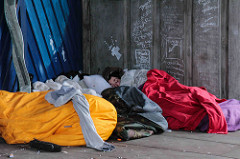Each year, between 2 to 3 million people in the United States experience some form of homelessness. Not everyone who is homeless is mentally ill, in fact, only 30-35% of individuals who are homeless have a mental illness. But those who are mentally ill and without a home seriously need help to get better.
Homelessness and mental health
 Unfortunately, sometimes when people are not mentally stable enough to maintain a job or a home, they become homeless. These people also often lack access to proper health care treatment. Many people don’t understand the connection between homelessness and mental health. Below are some facts that clearly represent the connect between mental health and homelessness.
Unfortunately, sometimes when people are not mentally stable enough to maintain a job or a home, they become homeless. These people also often lack access to proper health care treatment. Many people don’t understand the connection between homelessness and mental health. Below are some facts that clearly represent the connect between mental health and homelessness.
- Distinguishing between those with and without severe mental illness may be particularly important. Assertive community treatment offered significant advantages over standard case management models in reducing homelessness and symptom severity in homeless people with severe mental illness
- The New Freedom Commission on Mental Health made clear the need to address the public mental health system’s delivery of service to people without homes and with mental illness. This population is more likely to use hospitals than regular outpatient care, which is not only more expensive but results in fragmented service and less attention paid to ongoing mental health needs
- Although substance abuse and mental illness contribute to homelessness, the primary cause is the lack of low-income housing
- People with substance and other mental disorders experience even greater barriers to accessible housing than their counterparts: income deficits, stigma and need for community wraparound services
- The remediation of homelessness involves focusing on the risk factors that contribute to homelessness as well as advocating for structural change
Photo by Maureen Barlin


